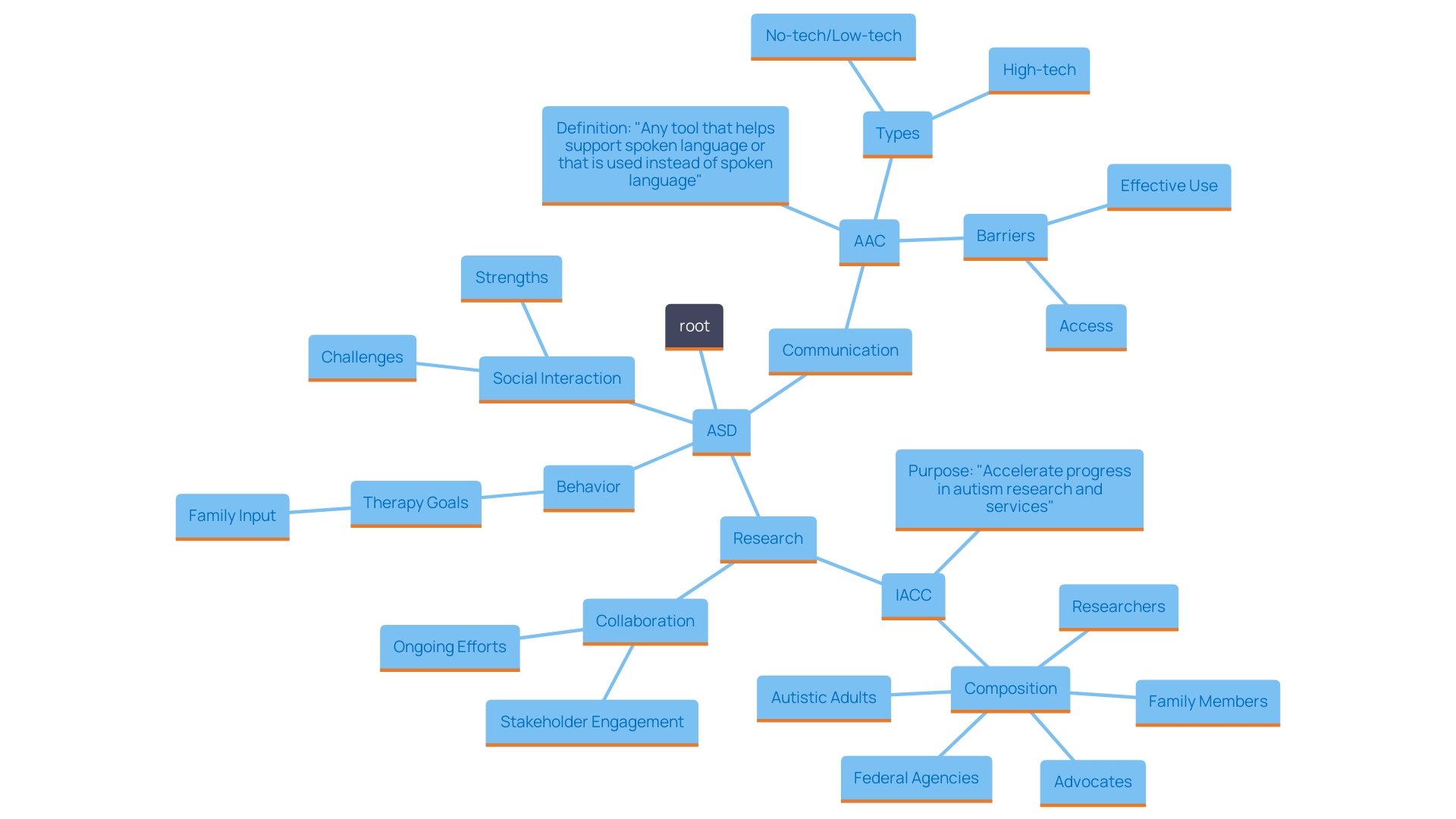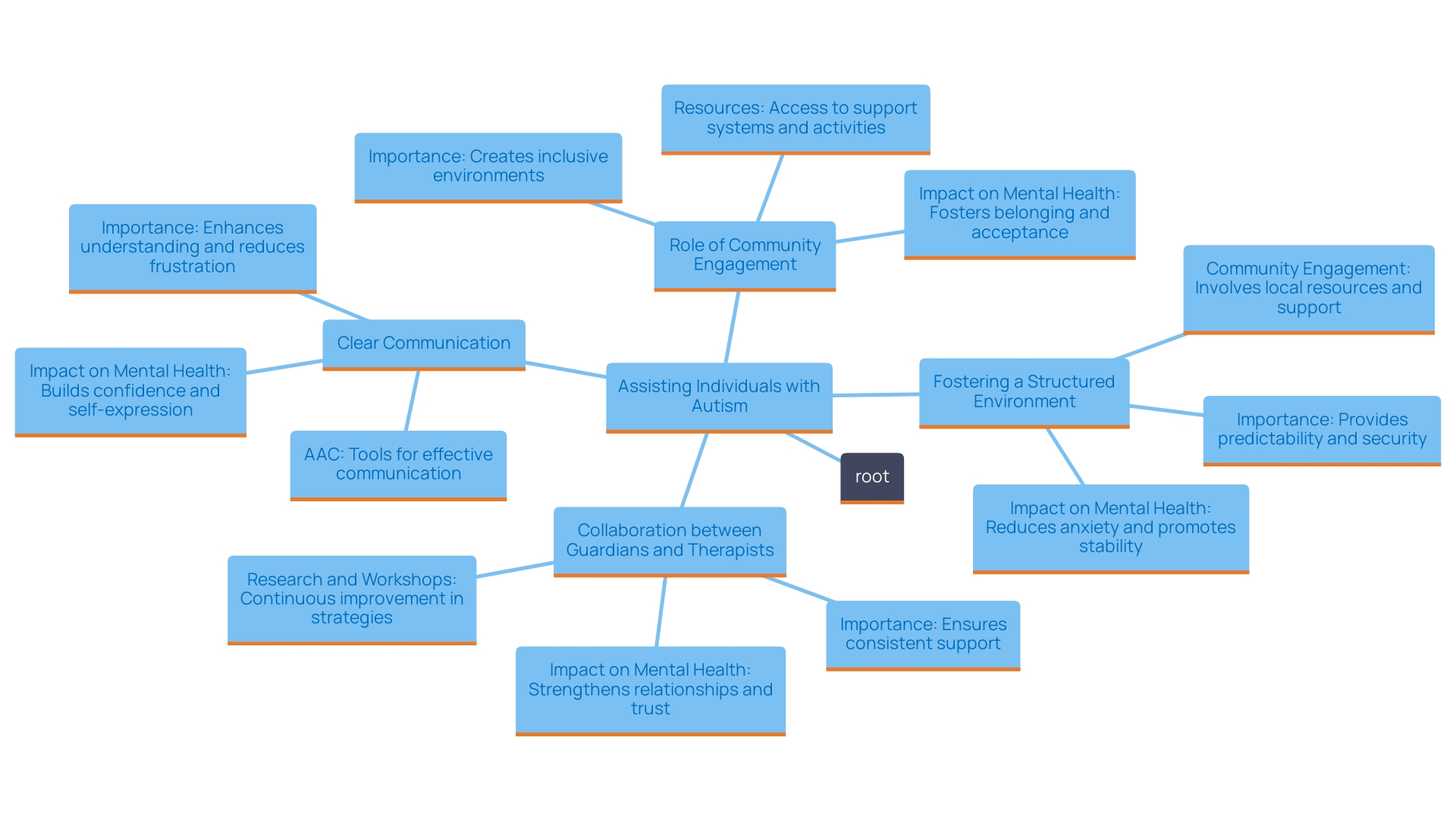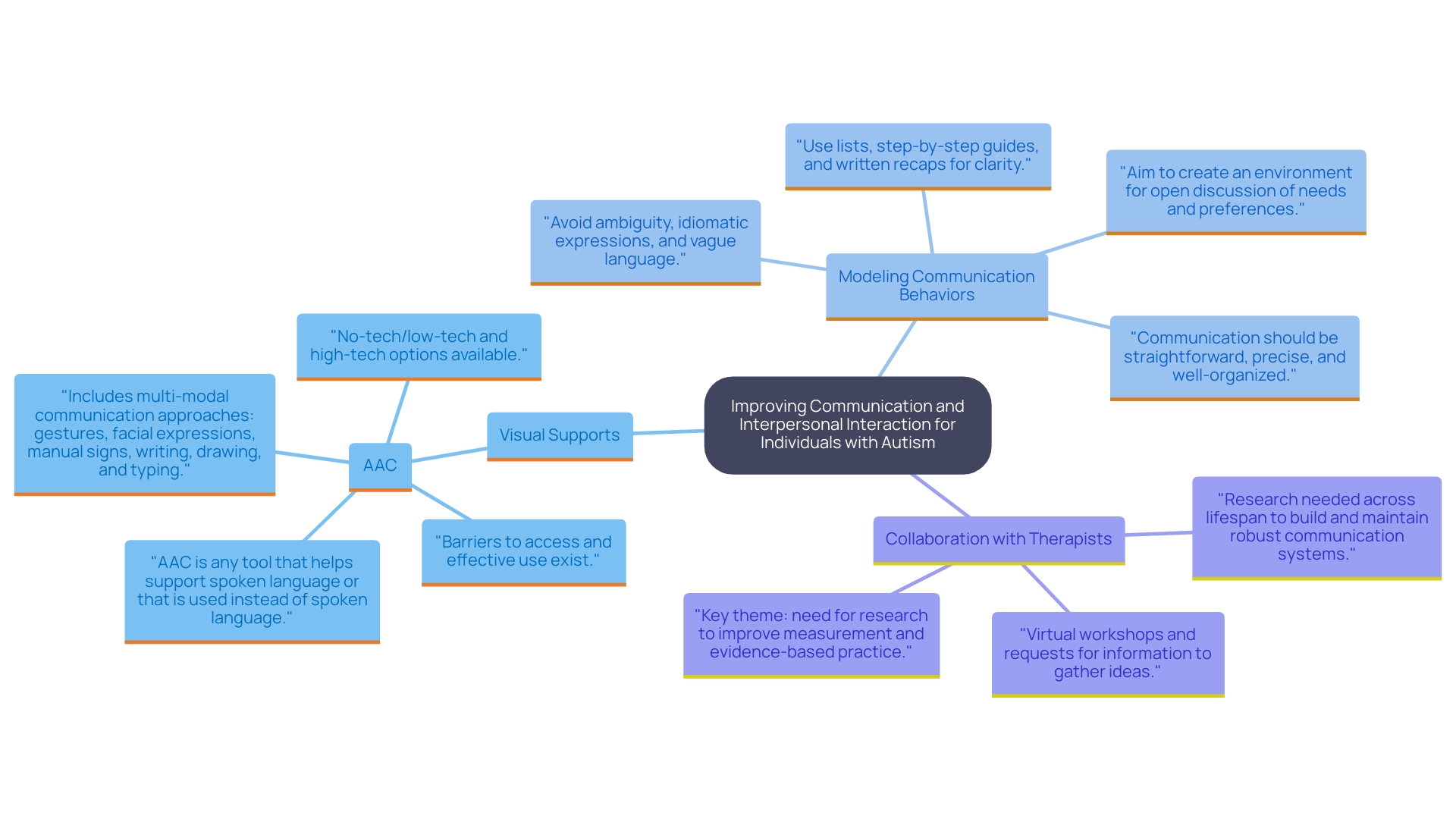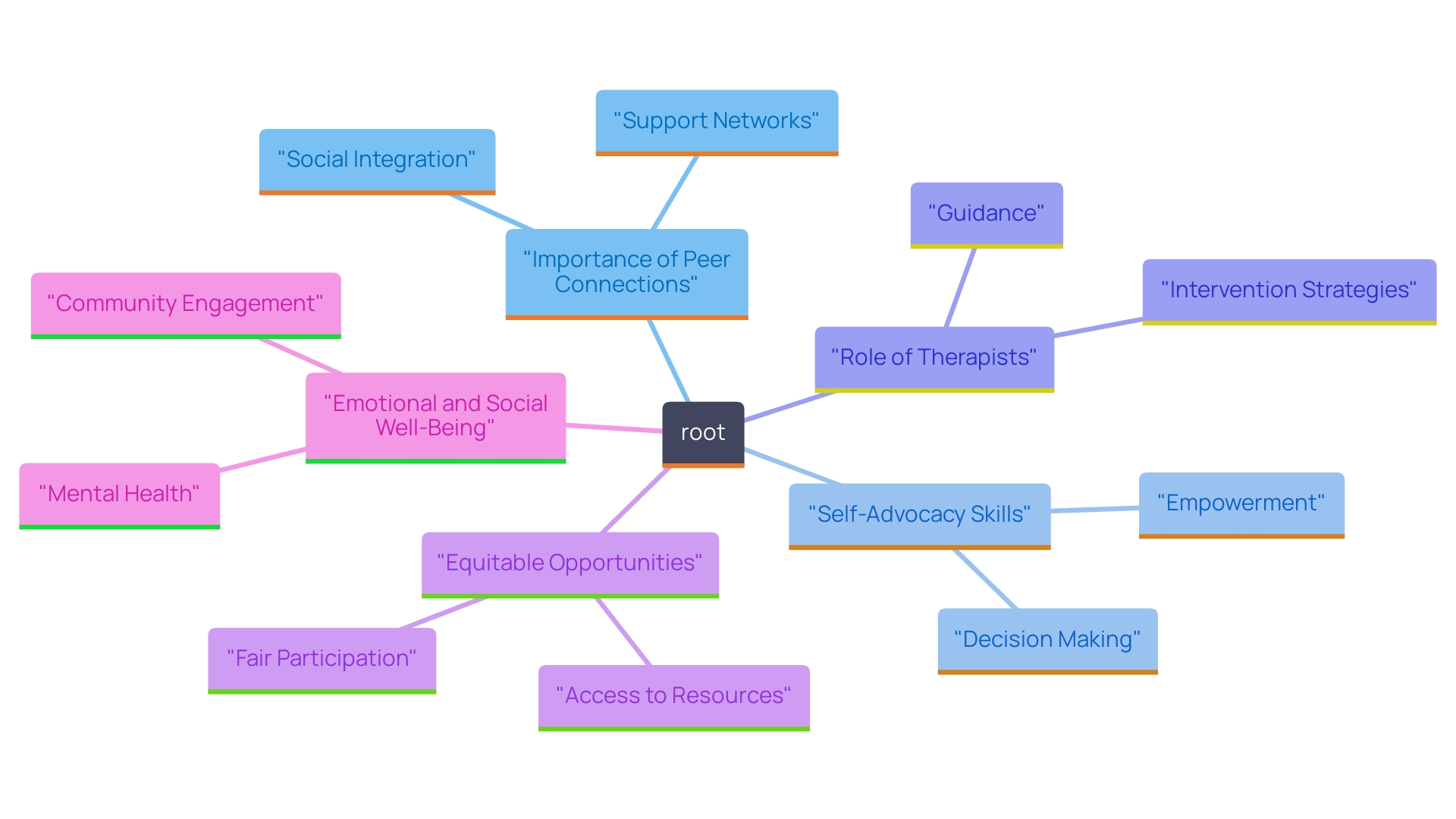Introduction
Navigating the complexities of Autism Spectrum Disorder (ASD) can feel overwhelming for many parents, yet understanding the intricacies of this multifaceted condition is paramount for fostering their children's growth and well-being. ASD affects social interaction, communication, and behavior, uniquely manifesting in each child. Recognizing these individual differences opens the door to collaborative efforts between parents and therapists, enabling the development of tailored strategies that promote meaningful participation in various aspects of life.
The need for equitable opportunities and the inclusion of voices from the autism community are increasingly being acknowledged, driving a shift towards more effective and relevant therapeutic goals. By actively engaging in their children's therapy journey and staying informed about the latest research, parents can empower themselves and their children to thrive in both social and emotional realms. This article delves into essential strategies for supporting autistic children, enhancing communication, and fostering positive peer relationships, all while emphasizing the importance of collaboration and advocacy within the autism community.
Understanding Autism Spectrum Disorder (ASD)
Understanding Autism Spectrum Disorder (ASD) is essential for both parents and therapists. ASD is a multifaceted neurodevelopmental condition that significantly impacts social interaction, communication, and behavior. Every individual with ASD showcases a distinct combination of strengths and challenges, highlighting the significance of acknowledging personal differences. By becoming familiar with the characteristics and variations of ASD, parents can forge stronger collaborations with therapists, leading to the development of personalized strategies that support their offspring's growth.
Studies have indicated that individuals with disabilities, including those on the autism spectrum, face an increased risk of being excluded from significant social engagement in essential areas such as home, school, and community environments. Dr. David (Dan) R. Offord, a prominent psychiatrist for youth, emphasized the need for equitable opportunities, stating, "Growing up in Canada is like a race.". I do not mind if my kids are in a race as long as the competition is fair This viewpoint emphasizes the importance of acknowledging both the unmet needs and the valuable contributions that individuals with ASD and other disabilities bring to their communities.
In recent discussions within the autism community, there has been a push for establishing meaningful therapy goals that involve input from individuals on the spectrum and their families. Historically, such goals have often been defined by professionals with little regard for the experiences of those directly impacted. This change is vital in guaranteeing that therapeutic approaches are effective, relevant, and empowering for young individuals on the spectrum.
Furthermore, ongoing developments in autism research, such as those promoted by the Interagency Autism Coordinating Committee (IACC), strive to enhance the coordination and communication across various federal entities involved in autism services. This collaborative framework not only encompasses professionals but also incorporates perspectives from the autism community, including autistic adults, caregivers, and advocates, ensuring that a comprehensive approach is upheld in therapy and support systems.
By engaging in continuous learning and staying updated with emerging research and treatment options, caregivers can play a pivotal role in their offspring's therapy journey. As one expert noted, caregivers must weigh the benefits and risks of prescribed medications and therapies, emphasizing the importance of verifying information through trusted sources. This proactive approach aids caregivers in navigating the complexities of ASD and fosters a collaborative environment where therapists and families can work together effectively.

Key Strategies for Supporting Autistic Children
Assisting individuals with autism effectively necessitates a diverse strategy that incorporates cooperation between guardians and therapists. Key strategies include fostering a structured environment, employing clear and concise communication, and maintaining a patient and consistent demeanor. Such an environment helps young individuals feel secure, which is vital for their mental health and development.
It is essential for guardians to partner with therapists to ensure these strategies are consistently applied. This collaboration not only offers a cohesive method for learning and behavior management but also enables parents to actively engage in their offspring's development. Regular conversations with therapists regarding the young one's progress and necessary adjustments can significantly enhance the effectiveness of these strategies.
Dr. David (Dan) R. Offord, a renowned psychiatrist for youth, emphasized that equitable participation of children, especially those with disabilities, is crucial for their mental health. He stated, “Growing up in Canada is like a race. "I do not mind if my kids are in a race as long as the race is fair." This highlights the importance of recognizing both the unmet needs and the unique strengths that young people bring to their communities.
Furthermore, individuals on the spectrum, especially those facing emotional and behavioral challenges, are at an increased risk of being excluded from significant community involvement. By working together, guardians and therapists can reduce ongoing sources of stress for these young individuals, ensuring they receive the assistance necessary for their healthy growth and overall well-being. Engaging with the autism community, as well as staying informed about research and services, can further bolster the effectiveness of this partnership.

Promoting Communication and Interaction
Encouraging communication and interpersonal interaction is essential for the growth and development of individuals with autism. One effective strategy parents can employ is the use of visual supports, like picture schedules and narrative tales. These instruments assist young individuals in understanding interpersonal signals and anticipations, rendering interactions less intimidating and more foreseeable. As Dr. David Offord, a renowned psychiatrist for young people, emphasized, equitable support for all individuals—including those with disabilities—ensures that they can participate meaningfully in various life domains, ultimately enhancing their mental health.
Furthermore, modeling suitable communication behaviors during playtime creates vital opportunities for young ones to practice their social skills with peers. This hands-on approach not only encourages interaction but also enables young learners to acquire knowledge in a relatable context. For instance, parents can initiate games that require turn-taking and sharing, which are foundational to effective communication.
Working together with therapists is essential in creating engaging activities customized to the distinct requirements of autistic youth. Such partnerships can lead to the use of Augmentative and Alternative Communication (AAC) methods—tools that support or replace spoken language. These techniques range from simple printed communication boards to advanced speech-generating devices. Research indicates that immediate access to a robust communication system can significantly enhance a young person's ability to express themselves and connect with others.
By establishing a nurturing atmosphere that integrates visual tools, demonstrated actions, and joint efforts with experts, parents can greatly improve their offspring's interpersonal abilities. This comprehensive method guarantees that neurodiverse youth are not merely members of their communities but are actively involved and assisted in their growth.

Fostering Positive Peer Relationships and Self-Advocacy
Nurturing strong connections among peers is vital for the emotional development of autistic youth. Parents can play an active role by organizing playdates or group activities that provide structured opportunities for their kids to interact with peers in a supportive environment. These exchanges not only improve interpersonal abilities but also assist young ones in feeling more included and comprehended.
Equally important is the development of self-advocacy skills. Motivating young individuals to express their needs and preferences instills a sense of empowerment. This essential skill allows them to navigate interpersonal situations with confidence, fostering better communication both with their peers and adults.
Therapists can be invaluable allies in this process, equipping caregivers with effective tools and strategies to support their offspring. For instance, techniques that encourage role-playing scenarios can help young people practice social interactions in a safe space, making real-life situations less daunting. The collaboration between therapists and parents ensures that therapy is tailored to meet the unique needs of each individual, particularly during significant transitions, such as moving from school to community settings, which can often be challenging.
Dr. David R. Offord eloquently stated, "Growing up in Canada is like a race. 'I do not mind if my offspring are in a race as long as the race is fair.' This sentiment underscores the importance of equitable opportunities for all individuals, including those with disabilities. Ensuring that children on the spectrum can participate meaningfully in their communities, schools, and homes is a fundamental aspect of promoting their mental health and well-being.
Furthermore, as emphasized by several studies, autistic individuals who face simultaneous emotional and behavioral difficulties are at a higher risk of social exclusion. Thus, the collaboration among parents, therapists, and communities is vital in creating an environment where these children can thrive socially and emotionally.

Conclusion
Understanding Autism Spectrum Disorder (ASD) is vital for supporting autistic children effectively. By recognizing each child's unique strengths and challenges, parents can collaborate with therapists to create personalized strategies that enhance social interaction and overall well-being. This partnership is crucial for ensuring equitable opportunities for children with ASD within their communities.
Key strategies include establishing structured environments, promoting clear communication, and maintaining patience. Consistent collaboration between parents and therapists empowers families and reduces stressors that may hinder development. Regular discussions about progress are essential for maximizing the effectiveness of these strategies.
Promoting communication through visual supports and modeled behaviors is important for developing social skills. Engaging in structured activities and utilizing Augmentative and Alternative Communication tools allows autistic children to actively participate and connect with others.
Additionally, fostering positive peer relationships and self-advocacy skills is crucial. Parents can facilitate social interactions through organized activities, while therapists provide strategies for navigating these situations. Encouraging self-advocacy instills confidence, enabling children to express their needs effectively.
Ultimately, collaboration among parents, therapists, and the autism community is essential for the social and emotional growth of autistic children. By actively engaging in their therapy journeys, parents can empower their children to lead fulfilling lives, ensuring they are not only included but actively engaged in their communities.




